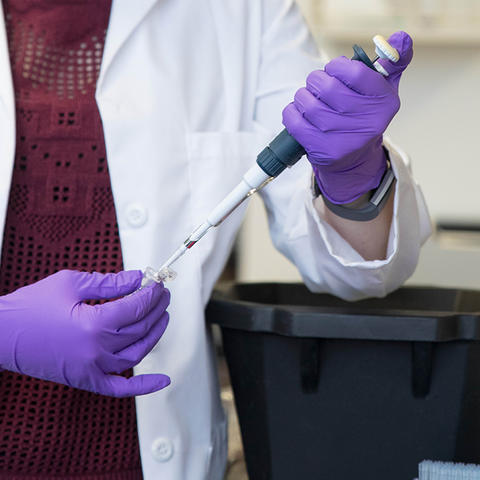
Talking Organ Donation with the Division of Transplantation
According to the Health Resources and Service Administration, more than 100,000 people in the United States are waiting for an organ donor at this very moment.
Since the 1960s, when the first successful kidney transplants in Minnesota were done at the University Hospitals, our transplant program has completed more than 13,000 organ transplants and has restored thousands of patients to health through this gift of life.
Talking Organ Donation: Liver Transplantation with Professor Srinath Chinnakotla, MD
For National Donate Life Month, Dr. Srinath Chinnakotla, surgical director for the department's Liver Transplant Program and executive medical director of the Solid Organ Transplant Service Line at M Health Fairview, talks about organ donation and how you can make a difference.

Q: Who can become an organ donor?
Dr. Chinnakotla: People between the ages of 20-50 can become a liver donor.
Entering the 21st century with novel outcomes, the Liver Transplantation Program previously performed roughly 75 liver transplants in 2020 before increasing the record volume in 2021. Through multidisciplinary understanding, the program is now capable of taking on more complicated cases from high-risk patients, including liver donations from those with hepatitis C, steatosis of the liver, and those who suffered a cardiac-related death. The treatment for hepatitis has also improved, attributing to increased acceptance numbers of related organ donations.
Q: Is there a cost to becoming an organ donor?
Dr. Chinnakotla: There are no costs associated with becoming an organ donor. The recipient's insurance covers all of the costs. Here in Minnesota, fellow faculty surgeon, Dr. Vanessa Humpreville was instrumental in advocating to get legislation pushed through to protect living donors from discrimination by insurers.
Finally, almost one year ago on June 13, 2022, Humphreville and colleagues attended the ceremonial session with Governor Walz as he signed the Living Donor Protection Act into law. The bill prohibits life, long-term care, and disability insurance carriers from declining or limiting coverage because a person is an organ or bone marrow donor. It also prohibits discriminating in the premium rating, offering, issuance, cancellation, amount of coverage, or any other condition based solely on donor status. The bill took effect on August 1, 2022.
Q: What organs can be gifted through living donation?
Dr. Chinnakotla: Donating the gift of life through a living organ donation is possible for the liver and kidney.
What's the future of organ donation?
Dr. Chinnakotla: Living donation has a great future in saving lives, and the quality of life for a living liver donor is excellent! Our Liver Transplant Program is expanding our indications for liver transplantation to include cholangiocarcinoma, colorectal metastasis and multi-organ transplants (combined heart liver). We also intend to use extended criteria livers to further our organ acceptance.
But, performing a successful transplant operation is just the first step. If the aftercare isn't sufficient enough, the patient could die in the ICU. Recently, the Scientific Registry of Transplant Recipients (SRTR) published a report on liver transplant outcomes. The registry determined the Liver Transplant Program with the University of Minnesota Medical Center to have one of the most successful outcomes on survival after transplantation in the nation by SRTR criteria - 5/5 bars. The University of Minnesota is the only program in Region 7 (MN, WI, IL, ND, SD) to achieve this status.
The results truly speak for themselves. Our care teams provide outstanding care to our patients, which makes us a true hub of excellence.
If you or someone you know are interested in signing up or learning more about saving lives through the gift of organ donation, visit here.
Check out more articles and resources on organ donation from the Medical School & Department of Surgery:
- Dr. Humphreville & Advocacy: The Living Donor Protection Act for Minnesota
- U of M Liver Transplant Program Celebrates Surgical Milestones
- Talking organ donation with U of M
- Where Discovery Creates Hope: The transplant patient who got two second chances

